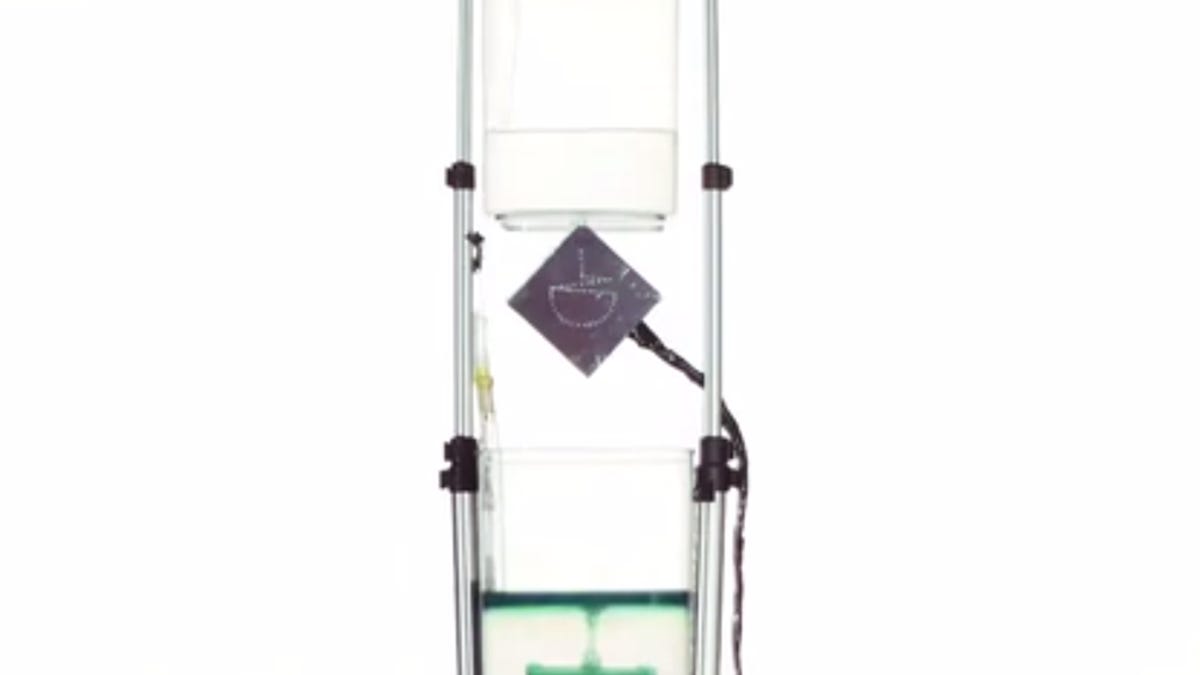$116 laser 3D printer lights up Kickstarter
A Canadian start-up makes serious waves on Kickstarter with a cheap photolithographic-based 3D printer, part of a mega effort to drive down costs -- and confusion -- commonly associated with consumer 3D printing.
Life's peachy for the Peachy Printer, a prototype 3D printer that collected more than $140,000 on Kickstarter in a little more than 48 hours.
What's causing all of the hubbub? People mostly seem attracted to Peachy's open-source hardware and software, as well as the catchphrase that refers to the device as "the world's cheapest 3D printer." With a suggested price point of $116 (per kit) that would most certainly be a true statement, but there are a few catches -- more on that in a bit.
How it works
Peachy, a cube-shaped device, utilizes a combination of photolithographic printing -- a process involving a powerful laser beam that can mold resin into desired shapes -- and a salt water-based drip process that gradually modifies the height of the object. How Peachy transforms a 3D print model from computer screen to the actual printer itself might be even more fascinating, however.
Users must first create the desired 3D model with the free software Blender, which can import just about any CAD file. Peachy's open-source plugin analyzes the 3D model and converts the data into an audio waveform. The host computer's headphone port transfers that signal to the Peachy Printer through a standard stereo audio cable. Perhaps the Peachy Kickstarter best describes what happens next:
This waveform drives a pair of electro magnetic mirrors. The higher the volume, the higher the voltage, the more the mirrors move. The purpose of these mirrors is to reflect and control the path of the laser beam. By using the audio waveform generated from the 3D model data to drive the mirrors, we are able to get the laser beam to draw out the shape of the object.
The host computer also plays a part in the drip system, as the method relies upon the computer's microphone port to listen for and count each drip so it knows when to stop the process.
In addition, the inexpensive device works with modern digital cameras of nearly any variety (Webcam, dSLR, etc.) for real-time 3D scanning. After initiating the scan, the user rotates the object in front of the Peachy Printer. A laser emits from Peachy and scans the intended object into a 3D model file. The scanning process sounds like a bit of science fiction (as noted in the Kickstarter page):
The software we wrote in Blender then searches through each pixel in every frame looking for the point where the laser is hitting the object. Next it calculates the distance of those pixels from the objects rotational center and plots the points and mesh accordingly in 3D space. You now have a 3D model of the real life object you scanned.
Before you mutter "hogwash," it appears the Canada-based Peachy Printer's creator, 28-year-old Rylan Grayston, may have something here, as the device has successfully completed 3D printing and scanning trial runs. A more thorough video showing how Peachy Printer works can be seen here.
Like most device proposals that come from Kickstarter, the Peachy Printer still has some growing up to do before it officially debuts, which won't be until July 2014. The finished 3D print molds appear slightly lesser in quality than printed products from seasoned (but way more expensive) devices such as the MakerBot Replicator 2 series.
In addition, no matter how much Peachy costs, you'll still have to pay for resin (so you can create things), but the startup suggests Peachy owners should buy from MakerJuice for the material. For example, the Web site sells a fast drying quality resin for $25 per 500 milliliter, a rather reasonable price.


